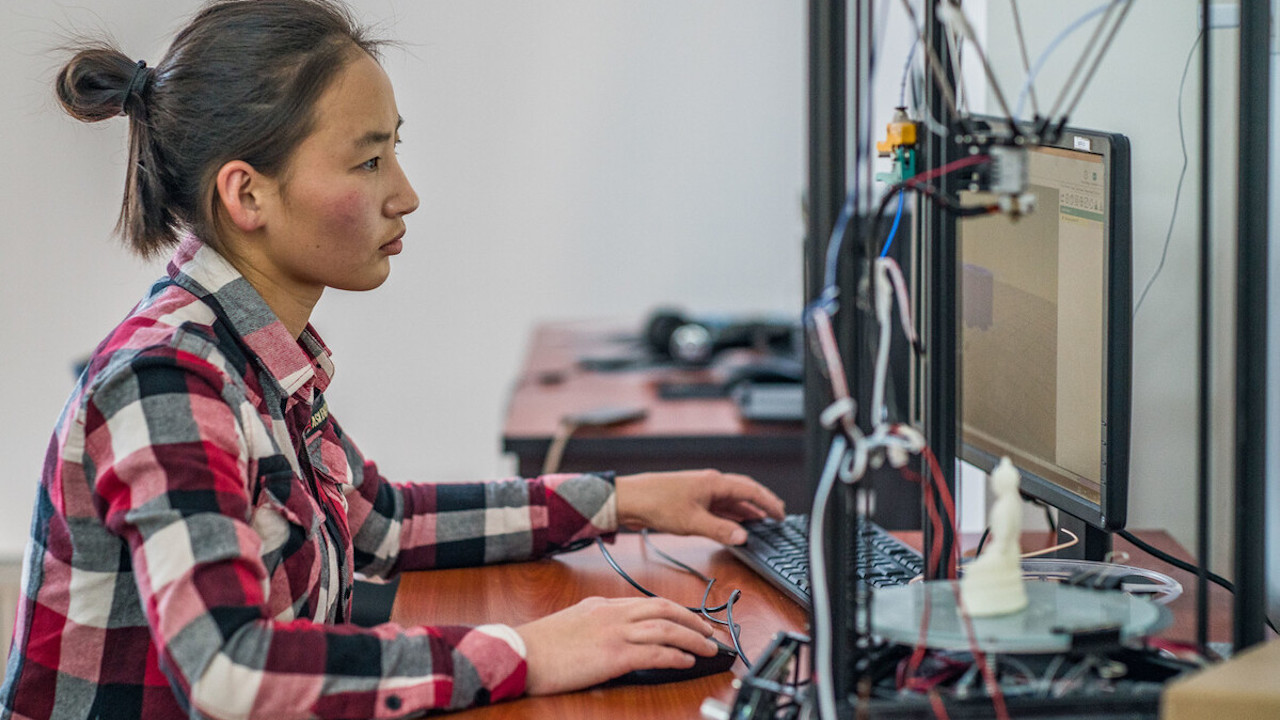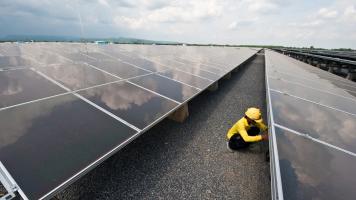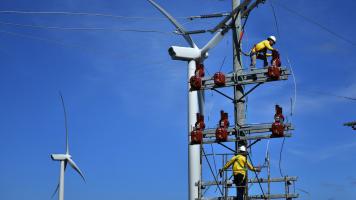
To ensure that no one is left behind, governments and employers must be mindful of existing inequalities, expand the green labor pool, and equip workers to fully contribute to the change. Photo credit: ADB.
Making the labor force more diverse, inclusive, and capable of taking on green jobs is crucial for Southeast Asian nations to reach their net-zero goals by 2050.
To achieve net zero by 2050, Southeast Asia is greening value chains and shifting to more sustainable industry practices, and this entails reskilling its labor force to adopt new technologies and work modes, while ensuring vulnerable groups also have access to jobs.
“It is people who are at the core of the transformation. It will be people who make or break this process,” said Veronica Joffre, senior gender and social development specialist at the Asian Development Bank (ADB), during the session, “Jobs of the Future: Building Diversity into the Net-Zero Transition,” at the ADB Southeast Asia Development Symposium (SEADS) 2023 on 30 March.
To ensure that no one is left behind, governments and employers must be mindful of existing inequalities, expand the green labor pool, and equip workers to fully contribute to the change. “Is the current supply of green talent enough to meet the current demand? How can we build the talent necessary for this, at the speed that is also required?“ said Joffre. “We need partnerships. We need collaboration.”
Reshaping the job market
During the session, Google.org Asia–Pacific Lead Marija Ralic said jobs will be likely be “lost” or transformed, and new ones created in the transition to the green economy.
“More than 80% of the jobs that will be created in 2030 haven't been invented yet. The World Economic Forum predicts that 50% of current employees need to be reskilled,” said Ralic, noting that employers and employees alike must learn to leverage technology for current and new jobs. They must also cultivate soft skills such as critical thinking, communication, stress management, and empathy.
A job role redesign is needed, agreed Prateek Hegde, chief operating officer of Generation Asia–Pacific, a nonprofit providing job training to address barriers to employment. The first task will be to identify the skills that will be needed in the transition. The second—and more important—task is to increase access to skilling, he said.
Beyond upskilling workers in jobs identified as high risk of going obsolete, he said stakeholders should be more inclusive and non-traditional in the overall approach to education, training, and recruitment. “It's important to reinvent how education and skilling will be designed and [be] made available to people from all backgrounds,” he said. “Invest in skilling before the transition actually happens.”
Diversity and inclusion in the green economy
The transition to a green economy cannot be done without the participation of women and youth who are active proponents of the net-zero transition. Building up their knowledge and capacities, as well as increasing their access to economically viable and green jobs, can only increase the value they contribute to the net-zero agenda.
Save the Children Regional Advocacy and Campaigns Director for Asia Shaheen Chughtai pointed out that young people have been at the forefront of highly effective public campaigns and other forms of advocacy for greener economies and greener societies. “Their efforts have helped push the topic of climate change and climate action further up the media and political agenda worldwide,” he said.
Involving the youth starts with conversation, such as through platforms like Forum Anak (“Child Forum”), which engages the youth as champions or rapporteurs, from the village up to the national level, said Indonesia’s Deputy Minister for Gender Equality, Ministry of Women’s Empowerment and Child Protection Lenny Rosalin during her keynote speech. “They are 32% of our total population. We improve their capacities so that they could take crucial roles in the future,” she said.
Indonesia has also piloted a holistic and integrated program, dubbed “Women and Child-friendly Villages,” to promote gender and children’s rights in governance, development, and community action. Thus far, the program has covered two villages each for two districts selected in every province of the country. Participating villages have a female village head and follow five directives: increasing women’s empowerment in the field of entrepreneurship from a gender perspective; increasing the role of mothers/families in childcare/education; reducing violence against women and children; reducing child labor; and preventing child marriage.
Rosalin said the transition to net zero must also be gender-responsive and promote women’s economic empowerment as “women are fundamental to the pursuit of an equitable, sustainable, and prosperous future for all.” She indicated that despite being disproportionately impacted by climate change, women tend to hold solutions, and have been championing climate mitigation and adaptation efforts from the grassroots level to the global negotiation table.
Rosalin rued that women are currently underrepresented in sectors likely to play a crucial role in determining access to new green jobs, such as energy transition, transportation, forestry, land use, and marine and fisheries, which are male dominated. Job opportunities created by the net-zero transition will likely not be spread evenly between men and women, risking further widening of existing gender inequalities in the labor market. “Men are currently significantly better placed than women to take advantage of the new green job opportunities arising from the transition… Without targeted support, there is the potential for women to be left behind in the transition to a net-zero economy,” she said.
Targeted interventions
Other panelists agreed with Rosalin on needing interventions to support women in gaining relevant skills, including by encouraging them to take up science, technology, engineering, and mathematics (STEM) subjects in vocational school and higher education. “STEM is one of the key leverages that can help women and girls take on the green jobs,” said Asian Venture Philanthropy Network Indonesia Country Director Dini Indrawati Septiani.
The consensus was to look for ways to lower barriers, whether by facilitating dialogue between youth advocates, development experts, and government officials, or designing programs that offer flexible learning opportunities especially for women who need to balance childcare responsibilities and work, and who belong to low-income communities.
Hegde spoke of how Generation, aided by Standard Chartered Foundation, established the women-only employability program #SheEmployed, which seeks to equip women in the 18–35 age bracket with practical and role-relevant skills, as well as customized career coaching, mentorship, and well-being support. The program also provides a stipend to offset opportunity costs or childcare expenses during the learning period. He suggested that governments consider offering similar incentives for jobseekers to take up skilling much more widely.
Economic Research Institute for ASEAN and East Asia (ERIA) Strategy and Partnership Director Giulia Ajmone Marsan underscored that inclusion and sustainability are interconnected. ERIA recently launched the Entrepreneurship, Startups, and Innovation Knowledge Lab and discovered that many innovators putting sustainability and inclusion at the center of their business models are women. Supporting these women-led enterprises—and the innovation ecosystems that develop female talent—will facilitate needed change.
“If the green future is not an inclusive future, the green transformation will be slowed down, so it's really an imperative… If we shape a green transformation that is not inclusive enough, we are really missing a big opportunity.” she said.

